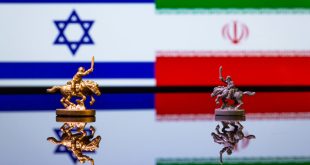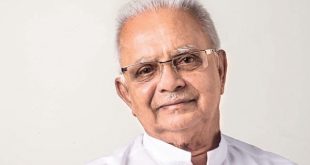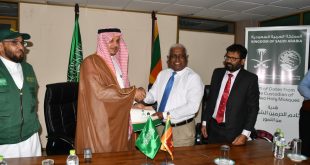Mao wrote famously, “Power flows through the barrel of a gun.” So do Constitutions. It is true that a Constitution, the fundamental law of the people, should have behind it a broad consensus among the people, but that consensus will mean nothing at all unless it is backed by the gun, with the means of legitimate violence in the hands of the Government. The relationship between the gun and the Constitution was clearly demonstrated at the end of the Second World War when the US, the victor, imposed a Constitution on Japan, and the Soviet Union, the victor, imposed constitutions on the East European countries.
In Sri Lanka the Government has just won the war against the LTTE. Why is it, then, that the President and the Government, the victors, evidently don’t feel free to work out Constitutional arrangements that can meet the needs and aspirations of the Sri Lankan people, including of course our Tamils, as they think fit without taking into account what outsiders think fit? The short answer is that the Government has destroyed the guns that were being deployed against us by the LTTE, but left totally intact are the infinitely greater number of guns that can be deployed against us by India.
It is understood that the President is not really enthusiastic about implementing the 13th amendment, but feels obliged to do so because of the Agreement with India. Certainly strong arguments can be marshaled in favour of his position. But will such an Agreement really matter if India has no more than the gun-power of the Maldives? The ugly truth that we have to face up to is that power flows through the barrel of a gun, and so do Constitutions.
I have referred above to “such an Agreement” having in mind, not just any Agreement, but the Peace Accords and all the horrors that went along with that, including the JVP rebellion and the indiscriminate killing of around 50,000 of our youths in the South. I have in mind also the abortion of the Vaddamarachchi operation on an Indian diktat, if not for which the LTTE could have been scotched at that time and a political solution could have emerged long ago. I have in mind also the irrefutable point made by the JVP that the 13th amendment has no democratic legitimacy behind it because the Parliamentarians who endorsed it had to bear in mind that their undated letters of resignation were in JRJ’s possession. Furthermore, that Parliament did not have democratic or any other kind of legitimacy after the infamously rigged Referendum. All that may be true, but the fact remains that under international law and practice governments have to abide by international agreements into which their predecessors had entered.
In an earlier article A Case for Devolution (Lakbima News of June 21) I argued that since the President had decided to implement the 13th Amendment, we might as well try to make a success of it as it could lead to a political solution. I pointed out that fears that devolution – particularly if it goes as far as federalism – would lead by an ineluctable process to separation were unrealistic. The historical record shows that involuntary separation takes place only when the dominant ethnic group is unable to prevent it through military action, a situation which is usually preceded by egregious blunders in the field of foreign relations. That and other arguments in favour of devolution were developed at a time when the LTTE seemed militarily invincible and priority had to be given to the question of how to prevent separation. Devolution seemed to be the best available specific at that time. But now the separatist movement has been destroyed militarily, and there is no prospect of its revival. It seems to me therefore that our priority has to shift from the problem of preventing separation to something else of crucial importance for the future of Sri Lanka. It is the problem of how to bring about the maximum degree of national unity in Sri Lanka.
In trying to bring about that unity we have to face up to the problem of the growing prevalence of identity politics. For complex reasons there has been a global trend towards retribalisation, a retrogression into groups, which finds its political expression in identity politics, meaning politics in which group interests predominate over everything else. By 2000 it came to be recognized that this had become the dominant global trend. It is arguable that devolution is required for the healthy functioning of identity politics. My counter-argument is that in fact there are innumerable ethnic groups all over the world which have their collective rights and have secured their group interests without any devolution at all. There is no reason – no inherent reason I mean – why we should not be able to satisfy group aspirations under a unitary system in Sri Lanka. An extensive degree of decentralization will certainly help.
It is arguable that devolution will militate against our achieving a high degree of unity in Sri Lanka. The great glory of the nation-state is that under it a far higher degree of unity has been possible than under any other state-system – for reasons that need not be explored in this article. Multi-ethnic and multi-cultural countries such as Switzerland and India have on the basis of federalism and quasi-federalism achieved a high degree of unity in diversity. So why can’t we make a success of devolution in Sri Lanka? There could be several reasons, of which I will mention only what seems to me the most important. The legacy of the past – our very terrible history of ethnic relations and the decades of ethnic conflict – makes it rather difficult to envisage a smoothly functioning devolutionary system. Up to now we have had only a caricature of devolution. Once a devolutionary system is really put into operation, centre/periphery problems will certainly get going. No one can be sure whether they will disappear after some time, or persist. The commonsensical conclusion is that we should try out a unitary system with an extensive degree of decentralization.
I stated above that achieving a high degree of national unity is of crucial importance for the future of Sri Lanka. In the new world order that is taking shape India will have the status of a great power with entitlement to its sphere of influence, which will certainly include Sri Lanka. It is evident also that India is emerging as an economic giant, which means that almost inevitably Sri Lanka will be drawn into the Indian economic orbit – and that will certainly have political implications. What are the implications? One is that the new world order could come to have the characteristics of a new imperialist world order, which could lead to the satellisation of Sri Lanka. There is only one way of preventing that – a high degree of Sri Lankan national unity.
 Sri lanka Muslims Web Portal Diversity and Inclusiveness
Sri lanka Muslims Web Portal Diversity and Inclusiveness



